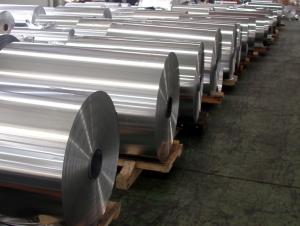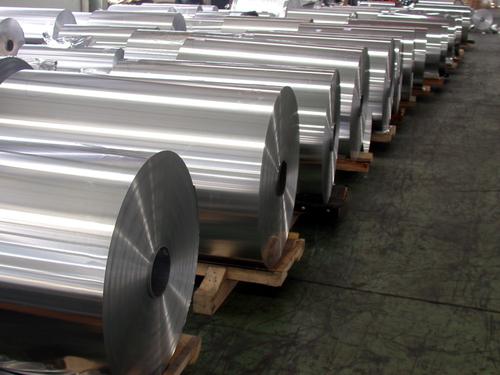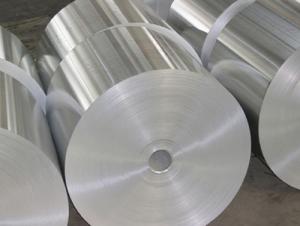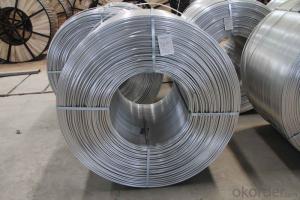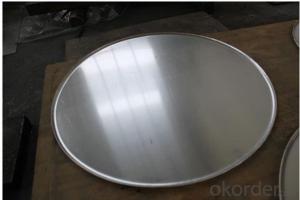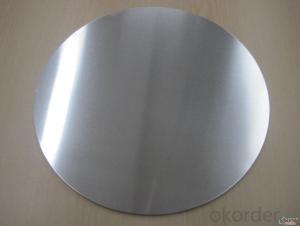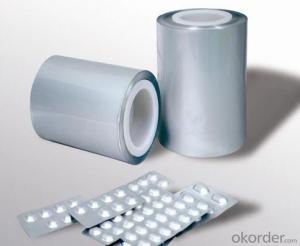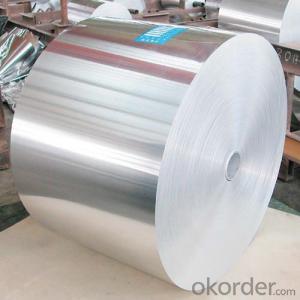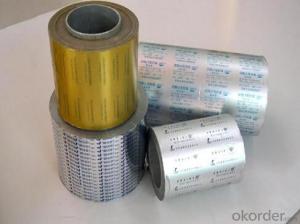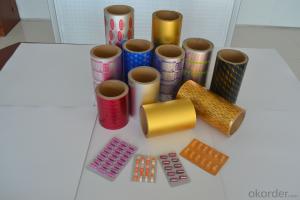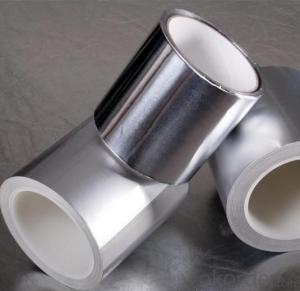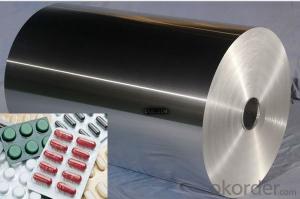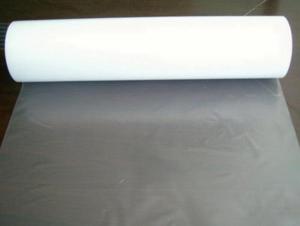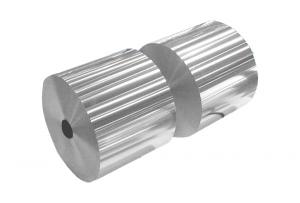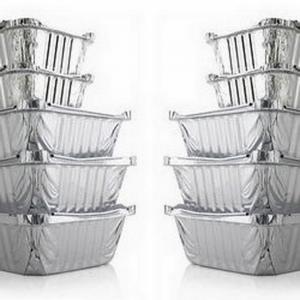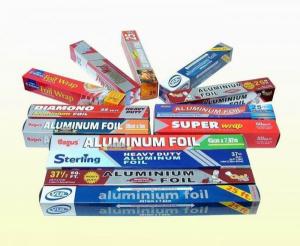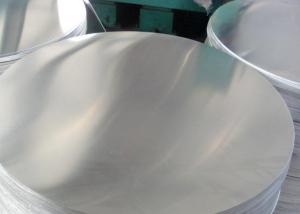Aluminum 8011-O-0.3mm Aluminum Foil Stocks for Pharma Packing
- Loading Port:
- CN
- Payment Terms:
- TT OR LC
- Min Order Qty:
- -
- Supply Capability:
- 7000MT m.t./month
OKorder Service Pledge
OKorder Financial Service
You Might Also Like
Specification:
Alloy No.:1235 8011 8079 1050 1060 1100 1145 3003 5052 5A02 8006
Temper:O H12 H22 H14 H24 H16 H26 H18 H19
Size: Thickness:0.005-0.20mm Width: 50-1600mm
Inner Diameter:76/152mm(Aluminum or Steel Core)
Outer Diameter:550mm Max
Tolerance: thickness tolerance +/-5%, width tolerance +/-1mm
Application:
Food Packing, Household Application, Cigarette Packing, Lamination, Medicine , Printing, Heat Sealing, Beer Packing, Roof Insulation Materials, Honeycome Materials and so on.
Mechanical Property:
Chemical Composite and Mechanical Property are meted with GB/T3198-2003,
ENAW, ASTM, JIS Standard
Surface Quality:
be free from Oil Stain, Dent, Inclusion, Scratches, Stain, Oxide Dicoloration, Breaks, Corrosion, Roll Marks, Dirt Streaks and other defect which will interfere with use
Certificate:
FOOD FDA, ISO9001:2000, SGS and ROHS(if client request, paid by client), MTC(plant provided), Certificate of Origin(FORM A, FORM E, CO.
Packing: First, plastic cloth; Second, Pearl Wool ; Third, wooden cases with drying agent ,without fumigation
Month Capacity: 5000mt / month for Aluminum Foil
Exporting Port: ANY PORT IN CHINA
Trade Terms: EXW,FOB,CIF,CNF
Terms of Payment: T/T or L/C at sight
- Q: This question asks about the chemical reaction between aluminum and water.
- <p>Aluminum does not react with water under normal conditions. However, when aluminum is heated, it can react with steam to form aluminum oxide and hydrogen gas. The reaction is exothermic and can be represented by the following equation: 2Al + 3H2O 鈫?Al2O3 + 3H2. This reaction is utilized in some industrial processes, but it is not a common occurrence in everyday settings. At room temperature, aluminum is protected by a thin layer of aluminum oxide that forms on its surface, which prevents further reaction with water.</p>
- Q: Is it possible to recycle old aluminum products and use them to create new aluminum products?
- <p>Yes, old aluminum products can be recycled and reused to make new ones. Recycling aluminum is a highly efficient process that conserves resources and energy. The recycling process involves melting down the old aluminum, which requires significantly less energy compared to extracting aluminum from raw materials. This makes aluminum one of the most recycled materials in the world, with a closed-loop recycling system that allows for continuous reuse without significant loss in quality.</p>
- Q: What precautions should be taken when using aluminum containers for food and beverages to ensure safety?
- <p>When using aluminum containers for food and drink, safety measures include avoiding prolonged storage of acidic or alkaline foods, as they can cause aluminum leaching. Do not heat aluminum containers in a microwave or expose them to high temperatures, as this can also lead to aluminum release. Regularly inspect containers for signs of wear or damage, as these can increase the risk of contamination. Always use food-grade aluminum containers and avoid using them for non-food items. Washing aluminum containers with mild detergents and avoiding abrasive cleaners can also help maintain their integrity and safety.</p>
- Q: This question asks about the safe usage of aluminum in everyday life.
- <p>Aluminum is widely used in daily life due to its lightweight and corrosion-resistant properties. To use aluminum safely, ensure that aluminum cookware is not used for acidic foods as it may leach aluminum into the food. Avoid storing acidic beverages like soda in aluminum cans for extended periods. Use aluminum foil in moderation, especially when cooking at high temperatures, as it can release aluminum into food. Always wash aluminum utensils thoroughly before and after use. For aluminum cans, recycle them to reduce environmental impact and avoid ingestion of aluminum particles from damaged cans.</p>
- Q: What measures should be taken to ensure safety while working with aluminum?
- <p>When working with aluminum, it's important to follow safety precautions. Always wear appropriate personal protective equipment (PPE) such as gloves, safety glasses, and a dust mask to prevent inhalation of aluminum dust. Ensure good ventilation to avoid the buildup of fumes. Use proper tools and equipment to handle aluminum, as it can become sharp and cause cuts. Be cautious of the heat generated during cutting or welding, as aluminum conducts heat quickly and can cause burns. Store aluminum in a dry place to prevent it from reacting with moisture, which can cause it to corrode. Lastly, be aware of the fire hazard associated with aluminum dust and take necessary fire prevention measures.</p>
- Q: Is it safe to use pure aluminum for baking or roasting food in a traditional oven or grill?
- <p>While pure aluminum is a common material in cookware, it's not recommended for direct use in baking or roasting food in a traditional oven or grill. Aluminum can react with acidic foods, potentially leaching aluminum into the food. Additionally, aluminum foil can burn and create a hazardous situation. For baking or roasting, it's safer to use materials specifically designed for these purposes, such as parchment paper, silicone baking mats, or oven-safe dishes.</p>
- Q: Is there a link between aluminum exposure and the development of dementia?
- <p>Aluminum has been a subject of concern regarding its potential link to dementia, particularly Alzheimer's disease. However, current scientific consensus indicates that there is no conclusive evidence to support the claim that aluminum causes dementia. Extensive research has been conducted, and the majority of studies have not found a direct causal relationship between aluminum exposure and the development of Alzheimer's or other forms of dementia. While aluminum is naturally present in the environment and can be found in some foods, water, and medications, the body typically does not absorb significant amounts, and any absorbed aluminum is usually efficiently excreted. It is important to continue monitoring scientific research for any new findings, but as of now, aluminum is not considered a proven cause of dementia.</p>
- Q: Is aluminum a component in the manufacturing processes of glass and ceramics?
- <p>Aluminum can be used in the production of glass and ceramics, although it is not a primary component. In glassmaking, aluminum is sometimes added to reduce the coefficient of expansion, making the glass more resistant to thermal shock. It can also improve the chemical durability and electrical insulation properties of the glass. In ceramics, aluminum compounds are used as opacifiers, colorants, or to enhance the mechanical properties of the final product. However, the use of aluminum in these industries is typically in small quantities and serves specific purposes rather than being a fundamental part of the material composition.</p>
- Q: This question asks for an overview of the various types of aluminum alloys that exist.
- <p>Aluminum alloys are categorized into several series based on their primary alloying elements. The main types include: 1. 1xxx series: Pure aluminum alloys with 99.00% minimum aluminum content. 2. 2xxx series: Aluminum-copper alloys, known for their high strength. 3. 3xxx series: Aluminum-manganese alloys, which offer good formability and moderate strength. 4. 4xxx series: Aluminum-silicon alloys, used for welding wire and filler materials. 5. 5xxx series: Aluminum-magnesium alloys, characterized by good formability and corrosion resistance. 6. 6xxx series: Aluminum-silico-magnesium alloys, known for their high strength and excellent machinability. 7. 7xxx series: Aluminum-zinc-magnesium alloys, which are the strongest and most widely used in the aerospace industry. These alloys have various applications based on their unique properties, such as strength, corrosion resistance, and formability.</p>
- Q: This question inquires about the potential differences in cooking performance when using various types of aluminum foil.
- <p>Yes, there are differences in cooking performance between different types of aluminum foil. The thickness of the foil can affect heat distribution and cooking time; heavier gauges are more durable and better for roasting and baking, while thinner foils are suitable for lining pans or wrapping foods. The quality of the foil, such as whether it's non-stick or not, can impact food release and cleanup. Additionally, some aluminum foils are designed to be heat resistant up to higher temperatures, making them suitable for broiling or grilling, while others may not withstand such high heat. It's important to use the appropriate type of aluminum foil for the specific cooking method to ensure food safety and optimal results.</p>
Send your message to us
Aluminum 8011-O-0.3mm Aluminum Foil Stocks for Pharma Packing
- Loading Port:
- CN
- Payment Terms:
- TT OR LC
- Min Order Qty:
- -
- Supply Capability:
- 7000MT m.t./month
OKorder Service Pledge
OKorder Financial Service
Similar products
Hot products
Hot Searches
Related keywords
